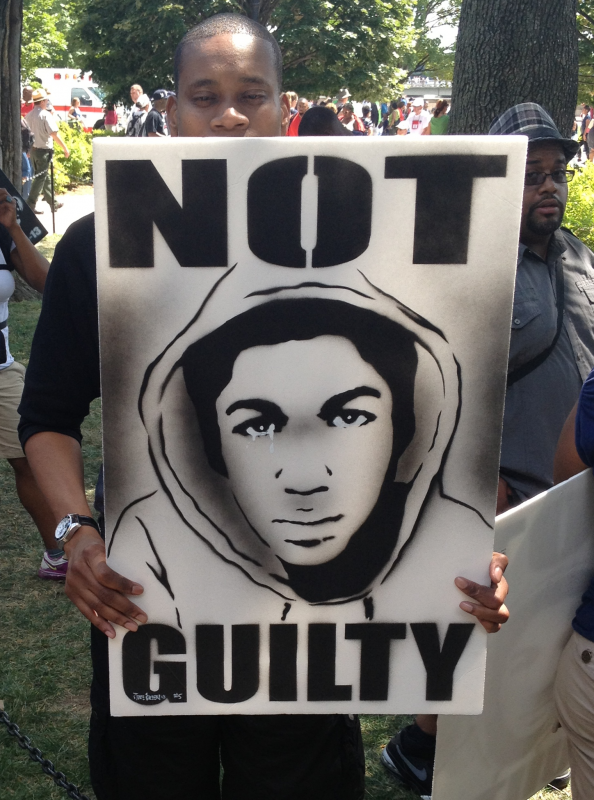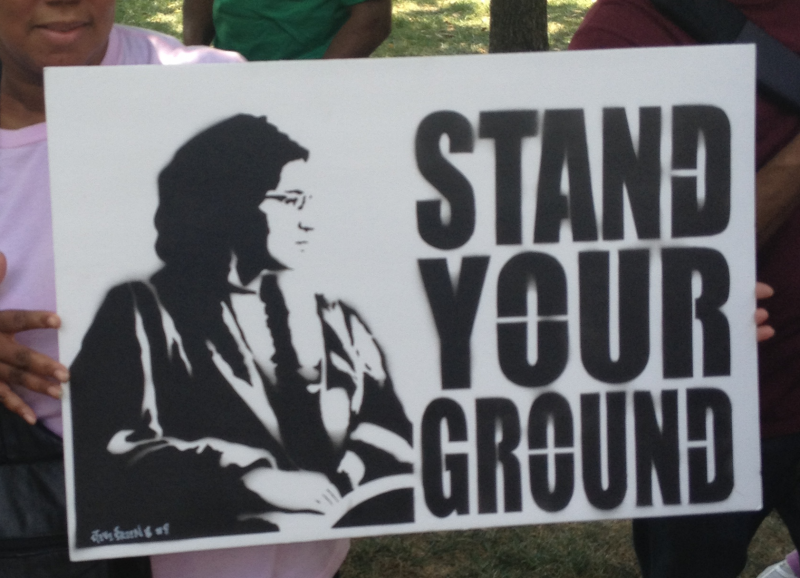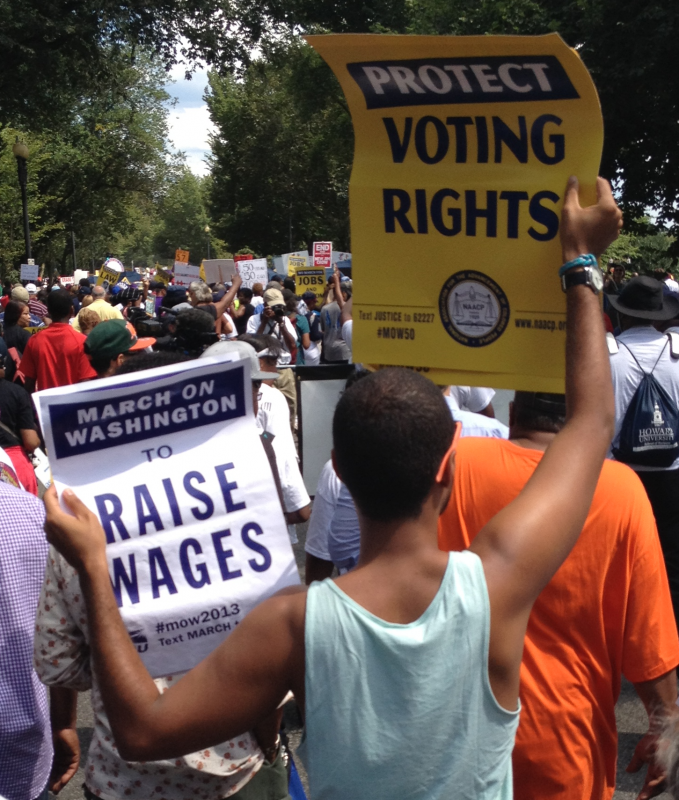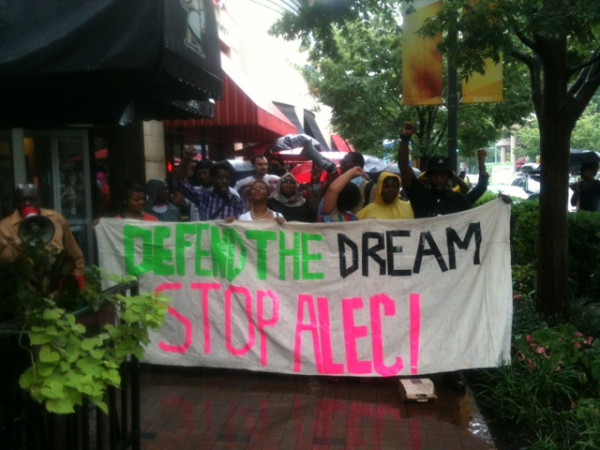Submitted by Brendan Fischer on
"The task is not done, the journey is not complete," said Martin Luther King III on Saturday's 50th Anniversary of the March on Washington.
 "The vision preached by my father a half-century ago was that his four little children would no longer live in a nation where they would judged by the color of their skin but by the content of their character," he said.
"The vision preached by my father a half-century ago was that his four little children would no longer live in a nation where they would judged by the color of their skin but by the content of their character," he said.
"However, sadly, the tears of Trayvon Martin's mother and father remind us that, far too frequently, the color of one's skin remains a license to profile, to arrest and to even murder with no regard for the content of one's character," he said.
Trayvon Martin's face was the most prominent at the event, with more signs bearing his visage than that of Martin Luther King, Jr. or President Obama. "We shall overcome" was sung with new verses calling for "Justice for Trayvon." Martin's mother, Sabrina Fulton, briefly addressed the crowd.
Signs were everywhere calling for the passage of "Trayvon's Law" to repeal Stand Your Ground laws, which spread across the country thanks to the American Legislative Exchange Council (ALEC). The Center for Media and Democracy exposed how ALEC adopted the law as a "model" for other states in 2005, just months after the National Rifle Association pushed it through Florida's legislature; the legislation subsequently became law in at least two dozen states. The Stand Your Ground defense is more likely to be applied in cases of white-on-black killings than when the races are reversed.
Myrlie Evers-Williams, widow of the slain civil rights activist Medgar Evers, urged the crowd to apply a different meaning to the name of the controversial law. "We can think of 'standing your ground' in the negative." Evers-Williams said. "But I ask you today to flip that coin. Stand your ground in terms of fighting for justice and equality!"
 One hand-made sign read "Stand Your Ground" but with a picture of Rosa Parks -- who stood her ground by famously refusing to give up her seat on a bus.
One hand-made sign read "Stand Your Ground" but with a picture of Rosa Parks -- who stood her ground by famously refusing to give up her seat on a bus.
Voting Rights Under Attack
Voting rights were also at front of mind, thanks to a deluge of state-based legislation in recent years aimed at restricting the franchise for people of color, and the U.S. Supreme Court recently eviscerating key provisions of the Voting Rights Act.
"I gave a little blood on that bridge in Selma, Alabama, for that right to vote," said Rep. John Lewis, referencing the police brutality against civil rights demonstrators in 1965. "I am not going to stand by and let the Supreme Court take the right to vote away from us."
ALEC also had a role to play here: its "model" Voter ID Act served as the template for many of the restrictive voting measures introduced in a majority of states since 2011. Over 10 million Americans -- largely people of color and young people -- don't have the forms of ID required under the laws and face disenfranchisement in states where they are enacted.
That week, the Justice Department announced plans to file suit against Texas' ALEC-inspired voter ID law under Section 2 of the Voting Rights Act.
The Washington March for Jobs and Freedom
 Saturday's rally, like the march 50 years ago, was also focused on economic inequality.
Saturday's rally, like the march 50 years ago, was also focused on economic inequality.
As John Nichols notes at The Nation, the 1963 event -- called by A. Phillip Randolph, "one of the nation's most prominent socialists and longest serving labor leaders," -- was called "The Washington March for Jobs and Freedom."
Still, although economic conditions have improved since 1963, severe inequality persists. Poverty rates are down and education levels are up, but the black unemployment rate (12.6 percent) is nearly double that of whites (6.6 percent), almost the same ratio as in 1963.
One of the key demands of the 1963 march was an increase in the federal minimum wage.
At the time of the march it was $1.25, equivalent to about $9.25 in today's dollars -- $2 higher than the current minimum. The march organizers demanded an increase to $2 per hour, which today would be more than $14.80.
Interestingly, that is almost the same number demanded by fast food workers in cities across the country staging one-day walkouts for a $15 hourly wage; a nationwide walkout is scheduled for August 29. President Obama has called for a more moderate increase in the minimum wage, to $9 per hour, which would still be less than the equivalent rate in 1963.
And, perhaps not surprisingly, ALEC recently recommitted itself to opposing increases in the minimum wage, and has even called for a full repeal of minimum wage laws. And, it is pushing a bill to thwart local efforts to enact living wage requirements.
March on ALEC
 ALEC's role in promoting Stand Your Ground, voter ID, and a race to the bottom in wages and working conditions did not go unnoticed.
ALEC's role in promoting Stand Your Ground, voter ID, and a race to the bottom in wages and working conditions did not go unnoticed.
On Friday, August 23, one day before the March on Washington, We Got Next, a coalition of youth activist and organizing groups from around the country, marched on ALEC's offices in Virginia.
"We're tired of how [ALEC] has manipulated the legislative process, and we want to let them know we won't continue to stand by," Kim Moore, an activist and organizer with the group, told CMD.
"Many of these ALEC bills have a devastating effect on young people, particularly young people of color," she said, singling-out ALEC's opposition to living wages and support for voter ID and Stand Your Ground laws.
Moore said the coalition tried delivering a letter to ALEC, but were met by armed guards and locked doors.
"They want to continue to help write bills that will continue to harm us and impact our futures but don't want to hear what we want to say about it," she said.
"Martin Luther King, Jr's dream cannot thrive in same space as ALEC," she said. "They stand against everything he stood for."
